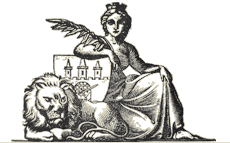- Domovská stránka
- Základní vyhledávání
- Rozšířené vyhledávání
- Hledání kalendáře
- O databázi
- Nápověda a kontakt
- Dary
- Podmínky použití
Vyběr jazyka




Název události:
Third annual quartet entertainment [Quartett-Soirée]
Místo konání: Clam-Gallas Palace
Typ akce: Art music culture
Datum: 04/03/1850 5pm
Sézona: Lent
Programme comprising:
- NĚMEC, František: instrumentalist, vl
- KÖCKERT, Adolph: instrumentalist, vl
- KRÁL, Jan: instrumentalist, va
- TRÄG, Anton: instrumentalist, vc
• Němec, František : vl Král, Jan : va Träg, Anton : vc Smetana, Bedřich : pf
komentář:
Early information that a series of chamber music soirées was to be performed in 1850 appeared in Bohemia 31/1/1850. This brief report commented that last year’s soirées by Němec, Träg, Král and Smetana remained happily in the memory of all music friends, and that the new series being organized promises programmes of the utmost interest. Detailed advanced news of the third of these events was published by Bohemia 3/3/1850, which reported that ‘The third and last Quartet-Soirée in Count Clam’s Palace takes place tomorrow, 4th March.’ The works to be performed were also listed. The date, time and venue of the event were stated in the Tagesanzeige of Bohemia 3/3/1850.
A review of this event was published by Bohemia 10/3/1850. This reported that ‘The programme of the last of the interesting soirées for chamber music contained three such vast numbers of this genus, that we were fearful of the excessively bold strain on the physical strength of our virtuosi, as well as ... the [continued] receptiveness and attention of a relatively numerous audience’. Of the first point, ‘the artists absolutely passed their awkward test’. Only in the Finale of Mendelssohn’s Quartet did they seem to lose strength, and this was attributed to their acceeding to vociferous demands to encore the ‘enthusiastically admired Scherzo movement. The performance of this fantastic movement was altogether splendid.’ There followed a highly enthusiastic appraisal, often laced with imaginative description and engaging metaphor, of the perceived similarity as composers and poets of Beethoven and Mendelssohn. The Scherzo movement from the Quartet was in particular likened in expressive content and the impression made upon the listener to the Chorus of Dervishes from Die Ruinen von Athen. The opening number of the concert, by ‘our greatest composer of instrumental music’, was specifically identified as belonging to the trilogy of [Razumovsky] Quartets ‘unique in music literature’ in which the composer pursued an organic development, ‘with demonic urgency striving ... for light and clarity. ... One knows not whether to admire most the poet or the contrapuntist, the artist or the philosopher.’ Of the performance, the correspondent felt that it was the most accomplished of the evening, and the players ‘made little of the difficulties of the work, which are legion.’ The third work in the concert, Schumann’s Piano Quartet, was granted a less enthusiastic review. The critic avoided commenting upon whether the composer had deliberately set out to challenge the ear by breaking rules of harmony. These were noted to arise when the ‘freedom and independence’ of his counterpoint resulted in harmonic dissonance. However, ‘where learnedness does not get in the way of the interested poet’ Schumann’s works were felt to contain ‘numerous beauties ... [that] are so excellent that the above negative impressions have no significance for determining the importance of the composition. Of great poetic interest is the Scherzo; considerably impressive is the Finale.’
The Bohemia review concluded by lamenting that this series of quartet entertainments containing nine works in ‘quantity and quality so brilliantly representing chamber-music literature’, was too short. ‘For this single significant fault ... the music-friends of our capital must thank these magnificent young artists.’ The events were reported to have been well attended
The performers in this third soirée were not specified by the event revue. From the preceding concerts in the series and the reference to the artists at the end of the final revue text, they certainly comprised Němec, Köckert, Träg, Král and Smetana.
Přehled zdrojů:
Bohemia (31/01/1850)Bohemia (03/03/1850)
Bohemia (03/03/1850)
Bohemia (10/03/1850)